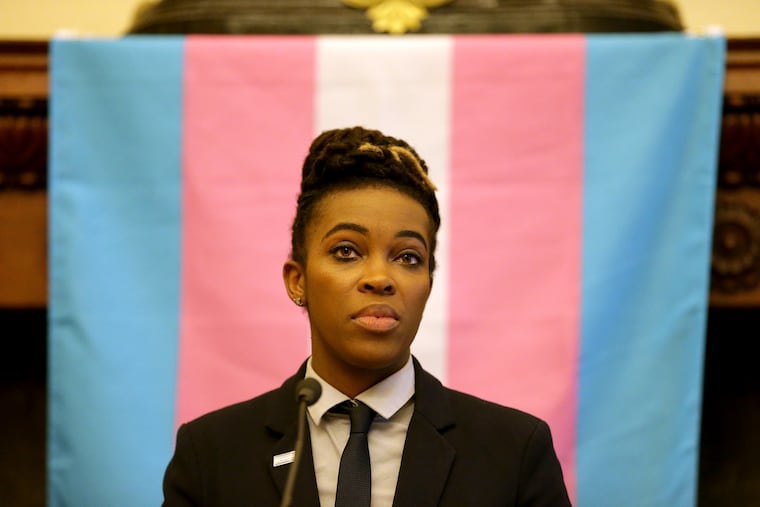Out of City Hall, Amber Hikes fought for trans folks, LGBTQ people of color — and that flag
She came into the office at a time of turmoil and focused her efforts on bolstering racial inclusion and making the office more intersectional.

Amber Hikes became the leading voice for LGBTQ people in Philadelphia government at a time of turmoil. Her predecessor had been fired, and the community was reeling over what some saw as the city’s failure to address deeply entrenched racism in the Gayborhood and beyond.
So, over the last two years, Hikes, a black queer woman, spent her time as executive director of the Mayor’s Office of LGBT Affairs focused on connecting the community’s most marginalized with city services — and each other.
The city announced Tuesday that Hikes, 35, has resigned, effective at the end of July, to take a new job elsewhere. Leaders in the LGBTQ community in Philadelphia say she leaves a legacy of inclusion through her work overseeing new programming aimed at better transparency. Hikes, who is nationally known in LGBTQ circles for her activism, also advocated to make Philadelphia’s Home Rule Charter more gender-neutral, and worked with the police department to develop a new policy for interacting with transgender and nonbinary people.
But at the end of the day, Hikes’ most visible legacy might just be a flag — the city’s Pride flag her office introduced in 2017 that added black and brown stripes to the rainbow to represent LGBTQ people of color.
The flag has since been adopted all over the world. Last week, she saw it emblazoned in Piccadilly Circus in London and “was jumping up and down like a schoolkid, screaming in the streets.” She’s glad it resonated with so many, but said it’s important to remember the initial backlash the flag received as a sign of the work left to be done.
“I cannot forget that I received hate mail and death threats for two stripes on a flag,” she said. “I think what that says about where we need to go is profoundly significant.”
For some LGBTQ people of color, that flag is, of course, more than a flag — it’s a symbol of purposeful inclusivity.
“Issues of race and racism within the LGBT community have not been brought to the surface in a way that they have since this flag,” said Marc Coleman, who worked with Hikes through the Independence Business Alliance (IBA) and the governor’s Commission on LGBTQ Affairs. “It’s made the conversation much more universal.”
The city is accepting applications to fill Hikes’ role. In the meantime, staff from the Office of the Chief Diversity and Inclusion Office will address the Office of LGBT Affairs’ day-to-day needs.
Hikes has been tight-lipped about what’s next, saying she’s exiting because it’s important to recognize "when it’s time to step back and give your post up.”
“This work really takes a toll on someone because of the climate that we’re in," she said, "and I think the toll it takes is unique and, frankly, kind of exponential when we talk about people of marginalized identities.” But, she added, “it was truly the greatest honor to be able to serve this community during this very challenging time.”
Besides the unveiling of that now-famous flag, Hikes oversaw programming and advocated for policy changes during her time in City Hall, which was also punctuated by controversy at the Mazzoni Center, the city’s largest LGBTQ health-care organization.
Francisco Cortes, the interim executive director of Galaei, a queer Latinx social justice organization, said Hikes addressed divides in the LGBTQ nonprofit space by overseeing the creation of the State of the Union, an event that over the last two years brought together the city’s biggest players to address issues facing the community. It also gave those embroiled in controversy the chance to address their counterparts honestly.
“She took these concerns and created what is an annual, huge event that we don’t see in any major city, where you see all the LGBT leaders talk with the community about what is going on,” Cortes said.
Under Hikes’ leadership, the office also developed the LGBTQ Community Leadership Pipeline, a training and placement program aimed at diversifying the boards of the city’s LGBTQ nonprofits. Zachary Wilcha, executive director of the IBA, worked with Hikes on the initiative and said one of her legacies will be creating a better board landscape, the effects of which will last for generations.
“Visibility is so important in our community,” he said. “When people see folks who look or move about the world the same as they do in leadership positions, it’s incredibly powerful.”
The program wasn’t without critics. Some said its existence implied marginalized people must undergo rigorous training just to get a seat at the table.
Coleman said Hikes navigated criticism from every corner of the community with a deft touch, saying “there’s been a lot of pressure and a lot of pain.” Said Reggie Shuford, executive director of the ACLU of Pennsylvania: “Doing that work in a community that has been so traumatized can be really difficult day in and day out, and I think it’s a sign of a true leader to know when to step away to take care of themselves.”
Chris Bartlett, executive director of Philadelphia’s William Way LGBT Community Center, said that beyond Hikes’ work addressing racism and transphobia, “she’s also a magnificent human being.”
He pointed to how she responded in June when Deputy Sheriff Dante Austin, a leader in the gay community, died by suicide. Bartlett said Hikes provided support to Austin’s family and pushed the Police Department to give him “the honor that he deserved.”
“We could always count on her,” Bartlett said, “to give voice to the voiceless and center the needs of those who had the greatest need.”